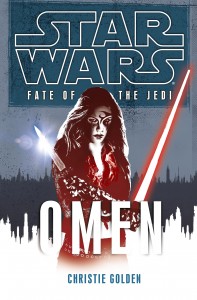 Here is why The Harlequin was disappointing to me. It was neither tragically horrid (despite a fleeting mention of the worst-named vampire lord of all time, Auggie) nor blandly boring. I mean, don’t get me wrong, I’ve got a complaint, big enough to fill a paragraph, and that’s enough for me to be satisfied that it wasn’t a complete waste of my time. But the thing is, it was actually kind of good. If Hamilton hadn’t done this to me once before, I might actually believe that the series could be in the midst of an upswing again. I mean, I did think the first several books were pretty okay. Still, I have good defenses now, and will not be tricked this time!
Here is why The Harlequin was disappointing to me. It was neither tragically horrid (despite a fleeting mention of the worst-named vampire lord of all time, Auggie) nor blandly boring. I mean, don’t get me wrong, I’ve got a complaint, big enough to fill a paragraph, and that’s enough for me to be satisfied that it wasn’t a complete waste of my time. But the thing is, it was actually kind of good. If Hamilton hadn’t done this to me once before, I might actually believe that the series could be in the midst of an upswing again. I mean, I did think the first several books were pretty okay. Still, I have good defenses now, and will not be tricked this time!
The point of the book, anyhow, is that vampire enforcers so secret and scary that big, powerful vampires like the ones Anita Blake hangs out with (and let’s not forget ’causes to be as powerful as they are’, by virtue of being a special necromancer with multiple strains of lycanthropy (none inconveniently active, though, as that would cause actual difficulties in her life, due to the many prejudices that abound) and also inexplicable vampiric powers that really don’t seem to benefit her much, just to act as an excuse for the author to throw lots of sex into the story without Anita feeling bad about herself (which I’ve probably already said any number of times by now in previous reviews) while giving the big, powerful vampires some of their power, which I believe is where we came into this parenthetical) are afraid to even mention that they exist have come to town to investigate a local vampire church that is not following the rules of how vampires work. Which is not a legal issue, just a traditional one; they have no lord to whom they all owe allegiance and whatnot, they are their own people. It’s a very American kind of thing, in its way. And of course, while these unnameable Harlequin are in town, they’ll want to see what’s up with the weird necromantic[1] lycanthropic vampiric entanglements that exist here in St. Louis but nowhere else. And that, of course, leads directly to the kind of danger that Anita Blake and her friends are uniquely qualified to shoot and/or (at least, more recently) fuck their way out of.
Except, you see, the sex is actually toned way back, both literally (which, whatever; I am neither particularly pro- nor anti- it for itself) as well as in terms of its plot relevance. Which is step one of how I am impressed with the upswing of the plot. It’s been… yeah, I don’t really know how many, nor do I care to go back and check at this point, but it’s been some number of books in which nothing happened except that Anita learned to control the way needing sex to keep herself alive (yes, literally) affects everything and everyone around her, during which twenty pages of an unrelated plot took place in the background. And that number was too high. So, definitely a nice change of pace, here. There’s still lots of relationshippy stuff, and not all of it of the romantic variety, but I’ve always been pretty okay with how Hamilton portrays her characters, so that’s alright. …although technically I’ve just perjured myself there. But let me catch up.
Decent plot, decent characters, improved percentage of sex fluff. Where, then, are my complaints? They are here! The lesser of them is that, Jesus, there are too many characters to keep track of! Maybe one of these times a ginormous and heretofore never mentioned threat, as seems to show up in more of these books than not, could handily kill off maybe a half- or a dozen characters that do not have speaking lines in more chapters than not? Just so random people can not walk-on soliloquize, and then vanish for another book or two. And I mean, even that wouldn’t be so bad[2], except that there Anita is, all first-person remembering who the person is, when she last had sex with him, and why she continues to care that he is alive. So I can’t even just pretend they’re random new people every time, like I might otherwise try to do. So, yeah, they need to die now, a lot of them. It is okay for her to go back to not knowing the names and penis sizes of her bodyguards now. All I’m saying.
But the bigger complaint was… okay, I’m going to delve into spoilers here. I don’t care enough to make a cut, but in the unlikely event that you do, I’m probably not going to make any further points from here, so you can stop reading now. Okay? Okay. So there’s this werewolf on-again off-again boyfriend of hers, Richard. And he’s been pissy for a good long time because she keeps having sex with more and more people and gaining more and more inexplicable powers, whereas all he ever wanted to be was a normal happy human. And he’s grown gradually more emotionally abusive toward her, which at first didn’t bother me because it started out as genuine confusion, not abuse, but the willful disregarding of anything she’s ever said to explain, which honestly may just be a symptom of how repetitive of an author Hamilton is but I will choose in this instance to take as evidence that he either started out abusive after all and it wasn’t obvious to me or else he got that way as he realized that there were never any consequences for it, has removed my small sympathy for his position. And now, he’s moved on to physically abusive, and I can’t tell if I should be crediting Hamilton with a subtle transition instead of the misogyny I’m seeing, but Anita again tells him it’s okay, more or less. I think you’d have to read the chapter or two to understand why it’s a fine line and I can’t actually be sure which is going on, but it looks more like physical abuse than sexual kicks to me. Anyway. He then piles on more emotional abuse, and eventually, at the climax of the confrontation with the Harlequin, the state of their relationship is a key component of the outcome of that battle.[3]
And at this climax, her magic sex power is turning into magic love power, which is again a nice thing; but Richard, in his role as stand-in for the audience, is justifiably paranoid that as soon as he gets involved, letting his guard down and all you see, it will turn back into sex magic, and there he’ll be, trapped in the middle of yet another deus ex orgica. And she gets all pissed off because he doesn’t trust her to know what her magic is like, even though she actually hasn’t for books on end and also never got mad about any of the abuse, but apparently this is where the line is. So, anyway, still in his stand-in for the audience role, she lets him have it for not being willing to accept her for who she is, multiple live-in boyfriends, powerful sex magic and all. And the so-thinly veiled goal of this is to say, look audience-as-Richard, Anita has done nothing wrong and she’s a good person and you should maybe stop judging her so harshly now that I’ve done my part by at least remembering that the plot should exist as more than atrophied connective tissue for my sex magic scenes. So, give a working girl a break, huh? And at first I was pissed off in the way that people get when they’re going to be ashamed but they’re not ready to embrace that yet. Except, no, wait, I realized: I was never annoyed with Anita for being immoral, the way Richard-not-quite-as-audience-like-as-he-thought would have me believe of myself. I always would have been more okay with her if she had embraced her sex magic right off the bat instead of being so negative about it herself for so long. No, what bothered me was that the writing was so clearly designed to justify her shift from mystery-solving necromancer to… well, whatever she is now, when the fact is, it shouldn’t have needed justification in the first place. So for Anita-as-author to justify it to Richard-as-audience now, and try to excuse hundreds of pages of truly awful prose in the same gesture?
I guess I had a little bit more than one paragraph’s worth of anger after all! Which, in a mistaken way that I simultaneously acknowledge and disregard, makes me feel better about the book after all.
[1] A pun that, I assure you, I never grow tired of.
[2] Seriously, who am I really fooling here? This must be what Stockholm Syndrome feels like.
[3] Which should also be a thing in my complaints list all by itself[4], but I’ve pretty much just accepted that metaphysical confrontation is Hamilton’s shorthand for mixing relationship drama with plot drama and moved on, because at least it’s better than all the sex-as-plot that had previously been going on.
[4] While I’m speaking of stuff I forgot to complain about, Jesus, the repetition. I mean, yeah, plot repetition too, and I know I’ve said this in previous reviews, but how can you write, again and again and again, ‘He was wondering why I did that.’ “You’re wondering why I did that, aren’t you?” He looked ashamed, but nodded. “I was wondering why, actually.” “Here’s why I did that:” …and so on. And, okay, as offended as I am by my question above, a better question is, how can you fail to edit that out, again and again and again? Jesus!
 Here is why
Here is why 